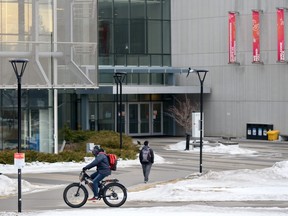Opinion: There is already a solution for easing high cost of post-secondary textbooks

Article content
Across the province, the cost of living is a major concern for all Albertans, but one group has been hit particularly hard: post-secondary students.
Tuition at many institutions is increasing by more than five per cent this year, and this is after years of increases as high as seven per cent. In a handful of cases, certain programs have had extraordinary increases practically doubling tuition. Tuition increases make the general inflation problem extra burdensome for those who are simply trying to get an education and usually don’t have stable, full-time income, and who may spend years after graduation paying off student loans. These increasing costs can result in students cutting back on the number of classes they take, having to take on extra work or, surprisingly, choosing not to buy required textbooks.
Less well-known is the fact that the cost of textbooks and other learning materials has been increasing well above the rate of inflation for decades. According to a 2014 CBC article, textbook costs have increased more than 800 per cent since the 1980s — more than double Canadian house price increases and triple the rate of the consumer price index. And in many cases, students no longer buy physical books they can resell but instead rent digital books.
Students are also unable to rely on their libraries to access textbooks, as publishers have stopped selling physical copies, forcing academic libraries to pay thousands for electronic versions, which they often cannot afford.
While the Alberta government has said it is paying close attention to the situation, British Columbia, Ontario and other provinces already have a solution: funding open educational resources.
Open educational resources, or OER, are high-quality, reusable teaching and learning materials that are made freely available. Provinces such as B.C. and Ontario have been developing these resources for years. In Ontario, a provincial OER program has saved students nearly $17 million since 2015, and in British Columbia, the number is over $32 million saved since 2012. Campus Manitoba estimates that its OER program has saved students almost $3.5 million to date. South of the border in Oregon, it has been estimated that each dollar invested in OER generates a savings of $14. An OER program does not just benefit students. As openly licensed resources, anyone can use the materials, from members of the public to businesses.
An OER program is not a new idea in Alberta. A short-lived program existed from 2014 to 2017, and there have been repeated calls for the province to renew such an initiative. Students across the province have been trying to raise awareness about this issue, including a recent campaign this past fall called Why Not Open. As part of the 2023 budget consultations, student groups and educators from across the province have recommended a strategic investment in a provincial OER program that would bring the cost-saving benefits students (and their families) in B.C. and Ontario get to Alberta. Supporting OER even appears as a priority in the government’s own Alberta 2030 strategy.
For Alberta students concerned about the rising costs of post-secondary education, it’s prudent for them to be asking if their next government will come through on its promise to address such costs by funding an approach to education that’s already proved successful in other provinces. As students, you provide value to your province with your education; it’s time to ask how your province provides value to your education — by investing in educational resources proven successful and cost-effective around Canada.
Sandra Amin is faculty of science representative for the University of Calgary Students’ Union; Magdalena Beukes is vice-president external for the King’s University Students’ Association; Erik Christiansen is a librarian at Riddell Library and Learning Centre at Mount Royal University; Michael B. McNally is an associate professor in the faculty of education at the University of Alberta.






Postmedia is committed to maintaining a lively but civil forum for discussion. Please keep comments relevant and respectful. Comments may take up to an hour to appear on the site. You will receive an email if there is a reply to your comment, an update to a thread you follow or if a user you follow comments. Visit our Community Guidelines for more information.